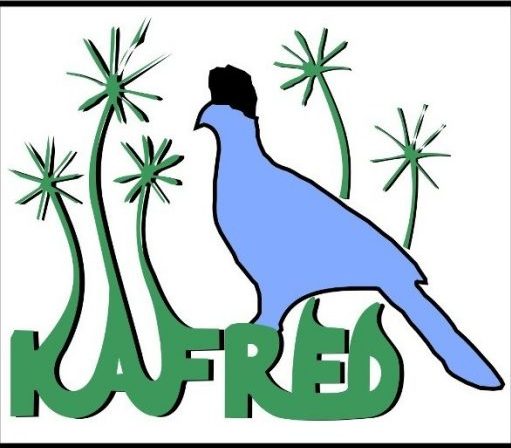Kibale Association For Rural and Environmental Development
KAFRED was formed in Bigodi in 1992. The group is an official Community Based Organization (CBO) in Uganda. Its purpose is to protect the local environment while advancing health, education and economic growth in the wider local community. John Tinka of Bigodi is an original founder and the continuing Program Manager. The group’s emblem is the great blue turaco, a majestic bird found in the Bigodi Wetlands Sanctuary.
Vision
Communities living in harmony wit nature
Mission
To advocate for management and sustainable use of natural resources in and around Bigodi Wetlands for he development of the Rwenzori Region
Poverty Reduction
KAFRED is entirely managed/run by the community. The Annual General Meeting elects a committee to represent the community. Revenues from tourism are ploughed into community projects such as education, health and sanitation. Most employees are from the community except in cases where there is a need for special skills. KAFRED’s net income is spent on community development projects, and therefore there has been direct investment. Also, because of employing the local community and buying local materials, there has been general development in the area. However, the general development is complemented by other income-generating activates in the area, such as agriculture and employment opportunities in neighboring Kibale National Park.
Below is an outline of how tourism has changed the Bigodi community:
- Employment of 17 teachers, 8 guides, 3 cooks, 4 security guards and 3 cleaners.
- Teachers and guides receive training and capacity building through KAFRED.
- The Women’s Groups are provided with space to sell handicrafts and peanut butter at the Wetlands visitor center.
- There is a market for local foodstuffs that can be consumed by visitors and tourists, for example bananas, tomatoes, onions, eggs and chicken.
- Prices in Bigodi are 30% higher in Bigodi than in neighboring villages that have no tourist trade.
- Local people have adapted to eating the above-mentioned foodstuffs, leading to improved nutrition.
- The number of permanent houses has grown from 2 in 1992 to 7 in 1995 to more than 30 today.
- In the late 1990s KAFRED hosted an average of 1000 visitors annually for an income of about 6 million Uganda Shillings (6m UGS). By 2008 the visitor count had risen to 3,500 with annual revenues of nearly 100m UGS. During the last financial year, we received over 4,000 visitors and an income of about 150m UGS.
- About 75% of net profits is spent on community projects. KAFRED began construction and management of Bigodi Secondary School starting in 1993. The school now has some 350 children. Because of tourism revenue, parents pay about 50% less for fees compared to other private or community schools.
- About 95% of wetlands visitors are non-Ugandans. This has led to other business opportunities such as hotels and lodges, which are in turn run by local people and which emply local staff.
- KAFRED has funded a community safe water project. Community water kiosks have been set up to serve at least 300 people. This has reduced the cost of water prices from UGS 800 to UGS 200 per 20 liter can.
- Building a house for mid-wives so that they can stay at the local health unit and support mothers whenever they need maternity services. In the recent past, women had to hold it until office hours or the family would have to hire a private car to Fort Portal town, 40 kms away on a bumpy road!
Biodiversity and Conservation
KAFRED’s main aim reads in part: “… and the conservation of natural resources, wetlands in particular”. Community development projects have been funded with income from tourism. The best examples are the secondary school, the wetlands boardwalk, safe water and the wetlands visitor center. This has helped to increase awareness and appreciation within the community of the importance of conservation.
Music, dance and drama by local groups such as Enyange Dramactors and Study Tours are used to increase the understanding and interpretation of natural and cultural values in the community, particularly in schools. Enyange Dramactors received training from Kibale and Semliki Conservation and Development Program in the 1990s. On the other hand, interpretation signs, write-ups, guided walks and presentations are used for conservation awareness building for both domestic and foreign visitors. Walks around and across the swamp are guided, visitors are encouraged to keep on the trail and all the garbage is carried back to the visitor’s center and properly binned. KAFRED does not provide catering services and this limits the levels of pollution.
In the mid 1990s, Ugandan environmental organisations carried out a capacity building program for KAFRED. This included among others trainings, an environmental impact assessment of KAFRED’s projects. A participatory planning exercise was conducted for about 40 participants, including members and representatives of homesteads neighboring the swamp, to draw up bylaws for the management of the swamp, which included a list of do’s and don’ts.
The Bigodi Women’s Group, also a member of UCOTA, is involved in the making and selling of handicrafts. Most of the materials and dyes used are natural and this was an environmental issue. KAFRED has through UCOTA organized training workshops in sustainable harvesting methods.

